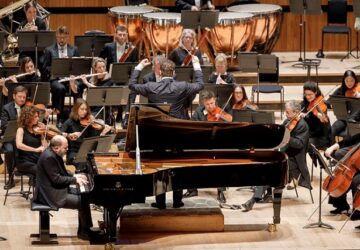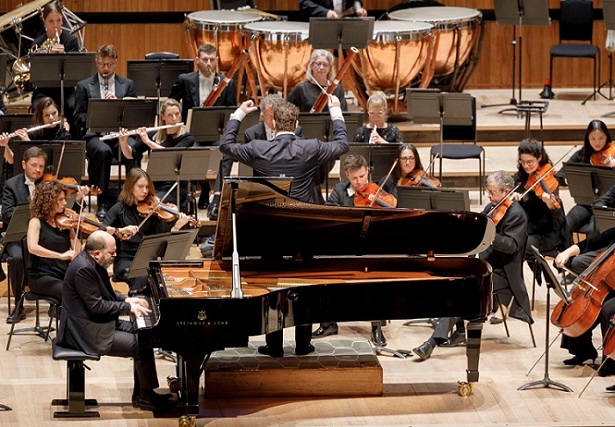 United Kingdom Rimsky-Korsakov, Rachmaninov, Smetana: Kirill Gerstein (piano), London Philharmonic Orchestra / Nikolaj Szeps-Znaider (conductor). Royal Festival Hall, Southbank Centre, London, 10.2.2023. (JC)
United Kingdom Rimsky-Korsakov, Rachmaninov, Smetana: Kirill Gerstein (piano), London Philharmonic Orchestra / Nikolaj Szeps-Znaider (conductor). Royal Festival Hall, Southbank Centre, London, 10.2.2023. (JC)

Rimsky-Korsakov – Overture from Ruslan and Lyudmila
Rachmaninov – Piano Concerto No.2
Smetana – Vysehrad; Vltava; Sárka; From Bohemia’s Woods and Fields from Má vlast
The London Philharmonic Orchestra’s ‘My Homeland’ concert, was part of their A Place to Call Home series, which aims to bring up topics such as belonging, exile and displacement to the limelight through music. As evidence of their belief in integrating music with social issues, the concert began with the orchestra’s Artistic Director announcing their desire to help Turkish and Syrian people by offering them free tickets for the concert in light of the tragic earthquake which took place a few days prior.
A tall and confident Nikolaj Szeps-Znaider strode in, took to the podium and, without further ado, launched the orchestra straight into Glinka’s lively and energetic Overture to Ruslan and Lyudmila; he did not even bother bringing a score. The orchestra responded with equal fervour, and instantly the whole place came alive as Glinka’s firecracker of an opening number moved the audience straight to the edge of their seats. The orchestra moved as one, and the terrifyingly fast passages all throughout the piece were executed flawlessly and with ease, allowing the charming and catchy musical ideas of Glinka to come through. The conducting was flamboyant and stylish. Normally I am not one to pay much attention to the five-minute opener of a concert which is clearly programmed to build the hype for the main act and allow for any latecomers, but the LPO’s performance of the Glinka overture definitely raised spirits which were already high and expectant of Kirill Gerstein.
When Kirill Gerstein, in his trademark suit jacket over a black turtleneck, began playing the all-too-familiar chords which open Rachmaninov’s infamous Second Concerto, it was just a little bit above audible. One worried about whether the sound was going to fill the massive Royal Festival Hall, but he was only just getting started. As the orchestra swarmed in with a gushing first theme, Gerstein rode the waves of its massive sound, getting more and more passionate. Under his fingers, Rachmaninov’s music bent this way and that; it did not at all feel like this was music written for Gerstein to play, but rather music which came from within himself. The tempo he chose was unorthodox for such a well-known piece; it seemed quite a lot faster than what concert pianists normally choose, but it did bring out the long, luscious melodic lines much more clearly, giving a sense of emotions overflowing each other. It was a heartfelt performance filled with cantabile singing often unheard in performances of this wonderful concerto. Tempo did not seem to be a conscious decision of Gerstein; it ebbed and waned depending on the emotional content of music, making us much more aware of the yearning embedded in Rachmaninov’s long lines.
Nor did virtuosity seem to pose a problem for Gerstein. For someone who programmes Busoni’s original music next to all of Liszt’s Transcendental Études, it would be natural to assume that Rachmaninov’s Second, even taken at a breakneck speed, wouldn’t pose much of a problem for Gerstein. However, under his fingers, the mammoth of a concerto seemed somehow to have shrunken in size, becoming a thing which he could mould according to his whim and will. One could make a case of how this diminishes the stature of the piece and, as my friend mentioned, the casualness with which he tackled the technical passages did somewhat lead to a sparseness of texture; nevertheless, his desire to bring out the cantabile lines produced a singularly unique vision of the piece. Special mention must be made to the orchestra for following Gerstein as he blazed through the concerto. The second movement was utterly beautiful; the way Gerstein did rubato made the piano come as close to being vocal over the lilting orchestral accompaniment as possible.
Confident Kirill Gerstein took the final movement of the concerto – which contains notorious technical challenges for the performer – at breakneck speed, never relenting apart from when the beautiful second theme enters, which Gerstein handled with great suppleness, singing his heart out at the piano. The beauty of his cantabile tone was utterly arresting. I also really enjoyed the way he emphasized off-beat accents during the fast sections in order to create an almost syncopated effect; it made the movement all the more exciting. Naturally, Gerstein received a well-deserved standing ovation straight after the triumphant ending of the concerto.
For the encore, Gerstein played a beautiful transcription of Rachmaninov’s ‘Silent Night’.
The second half was dominated by four movements from Smetana’s gigantic set of symphonic poems, Má vlast (My Homeland), which evokes pastoral and heroic images of his country, then Czechoslovakia. Despite Szeps-Znaider’s apparent knowledge of the score (from memory) and the confidence he exuded in his conducting, the orchestra did not seem very confident with most of the symphonic poems apart from the well-known second one: Vltava. Nor did I feel connected to the music, so the performance did not particularly attract me. Even though the evening’s concert took its name from Smetana’s composition, for me it was Kirill Gerstein’s conception of Rachmaninov’s second piano concerto – performed with a such a strong sense of desire and passion that it almost seemed more befitting to the theme of concert than Smetana’s symphonic poems – that really made the evening a stellar experience.
Jeremy Chan
